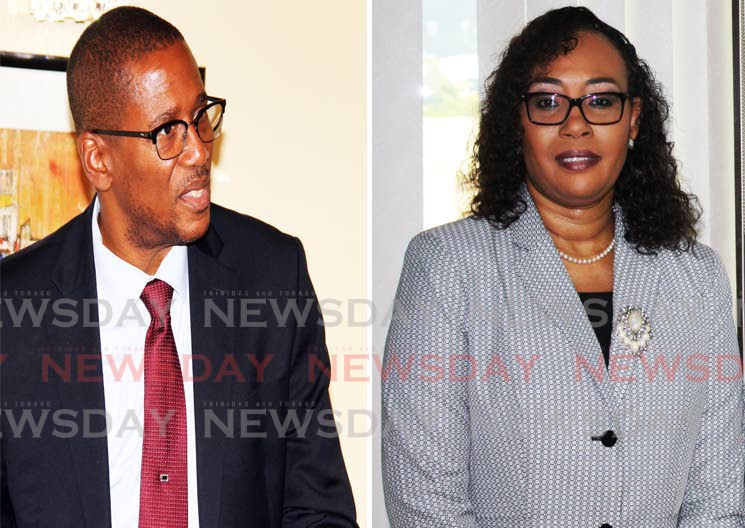Judge dismisses ex-chief magistrate's 'forced resignation' claim

FORMER chief magistrate Marcia Ayers-Caesar intends to appeal a judge’s dismissal of her legal challenge of her short-lived judicial appointment four years ago.
On Friday, Justice David Harris dismissed Ayers-Caesar’s judicial review claim, in which she alleged Chief Justice Ivor Archie and the Judicial and Legal Service Commission (JLSC) pressured her to resign. She alleged this happened after it was disclosed she had left 52 preliminary inquiries unfinished when she took up an appointment as a judge.
Harris held she was treated fairly by the Chief Justice, the JLSC – of which he is chairman – and former president Anthony Carmona.
“The claimant’s decision to resign was voluntary,” was his finding on Ayers-Caesar’s claim.
She had also alleged she was threatened that if she did not agree to resign as a judge, a recommendation would be made to Carmona to revoke her judicial appointment.
She also challenged Carmona through the Attorney General’s Office, complaining about his accepting the “forced letter of resignation.”
In her claim, she challenged both the decision by the JLSC on her alleged forced resignation and the former president’s decision to accept it.
She also sought declarations that the decisions were unlawful and impugned section 137 of the Constitution, which sets out the procedure for removing a judge from office.
Among the reliefs she asked for was her reinstatement as a judge, along with damages.
In a statement on the ruling, Ayers-Caesar’s lead attorney, Ramesh Lawrence Maharaj, SC, admitted the legal team had been confident the former chief magistrate would be successful in her challenge.
In the event, he said a decision has been taken to appeal Harris’s ruling at the Court of Appeal and the Privy Council if it comes to that.
Her attorneys are to ask the appellate court to expedite the appeal on the ground that the public will benefit from the court’s decision.
The Chief Justice testified at the trial in November last year after the Privy Council ruled Ayers-Caesar was entitled to cross-examine the JLSC’s witnesses.
In his 146-page decision, Harris dismissed Ayers-Caesar’s claim that the JLSC decided to seek her revocation, saying from the evidence of Archie and retired Justice of Appeal Humphrey Stollmeyer, a member of the JLSC who went on affidavit in the case, no decision had been taken at a meeting on April 27, 2017.
At that meeting, it was decided that the threshold for proceedings under section 137 “had been triggered and met” after Archie and Stollmeyer expressed the view that Ayers-Caesar’s position “had become untenable.” It was agreed that the former chief magistrate would be given the option to withdraw (resign) or the JLSC would have to meet to consider if it had sufficient evidence to institute disciplinary proceedings against her.
Harris found: “The JLSC did not invoke the section 137 of the Constitution but determined that it would consider continuing a process to ascertain whether it would be instituted.
“The JLSC did not decide and/or direct the Chief Justice whether as head of the Judiciary or as chairman of the JLSC to convey to the claimant the prospect of their consideration of the institution of section 137 as a threat or at all.
“The JLSC did not frame any charges against the claimant.”
He also found that the JLSC did decide and did direct, or expect, Archie to convey to Ayers-Caesar the option of resigning from the High Court, but did not direct that it take place that day or any specific day.
He also found that the JLSC did not act outside its powers under section 137, nor did it infringe Ayers-Caesar’s rights.
On her challenge of Carmona’s acceptance of her resignation, Harris found Carmona was not aware of the circumstances that led to her doing so, nor did he, wittingly or unwittingly, act jointly with the Chief Justice, the JLSC, or anyone else, to “unlawfully procure” Ayers-Caesar’s resignation from the High Court.
“The President’s continued acceptance of the claimants letter of resignation did not contravene the protections afforded her in section 137 or at all."
In dismissing all her arguments, Harris ordered her to pay 50 per cent of the JLSC and the State’s costs, which are to be assessed by a Master or the Registrar of the High Court.
Ayers-Caesar was appointed a judge on April 12, 2017 and resigned 15 days later.
In his testimony at the trial, Archie denied at any time asking her to resign or threatening her with disciplinary action. Harris said even if he had done so so, his actions could not bind the JLSC.
Also representing the former chief magistrate were Ronnie Bissessar and Vijaya Maharaj.
Senior Counsel Russell Martineau, Deborah Peake and Ian Benjamin, along with attorney Ian Roach and Marcelle Ferdinand, represented the JLSC. Senior Counsel Reginald Armour and attorneys Ravi Nanga, Ravi Heffes-Doon and Diane Katwaroo appeared for the Attorney General.


Comments
"Judge dismisses ex-chief magistrate's 'forced resignation' claim"